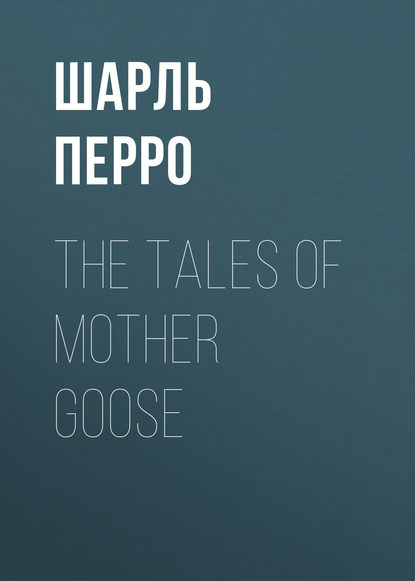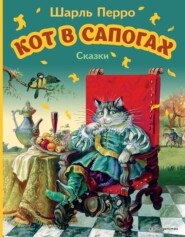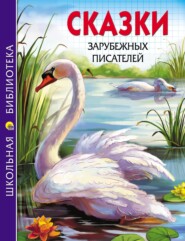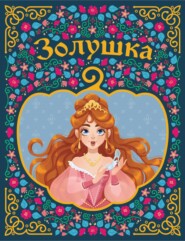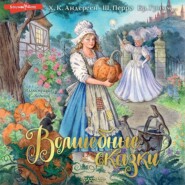По всем вопросам обращайтесь на: info@litportal.ru
(©) 2003-2025.
✖
The Tales of Mother Goose
Настройки чтения
Размер шрифта
Высота строк
Поля
He then took a great knife, and, coming up to these poor children, sharpened it upon a great whetstone which he held in his left hand. He had already taken hold of one of them when his wife said to him: —
"What need you do it now? Will you not have time enough to-morrow?"
"Hold your prating," said the Ogre; "they will eat the tenderer."
"But you have so much meat already," replied his wife; "here are a calf, two sheep, and half a pig."
"That is true," said the Ogre; "give them a good supper that they may not grow thin, and put them to bed."
The good woman was overjoyed at this, and gave them a good supper; but they were so much afraid that they could not eat. As for the Ogre, he sat down again to drink, being highly pleased that he had the wherewithal to treat his friends. He drank a dozen glasses more than ordinary, which got up into his head and obliged him to go to bed.
The Ogre had seven daughters, who were still little children. These young Ogresses had all of them very fine complexions; but they all had little gray eyes, quite round, hooked noses, a very large mouth, and very long, sharp teeth, set far apart. They were not as yet wicked, but they promised well to be, for they had already bitten little children.
They had been put to bed early, all seven in one bed, with every one a crown of gold upon her head. There was in the same chamber a bed of the like size, and the Ogre's wife put the seven little boys into this bed, after which she went to bed herself.
Little Thumb, who had observed that the Ogre's daughters had crowns of gold upon their heads, and was afraid lest the Ogre should repent his not killing them that evening, got up about midnight, and, taking his brothers' bonnets and his own, went very softly and put them upon the heads of the seven little Ogresses, after having taken off their crowns of gold, which he put upon his own head and his brothers', so that the Ogre might take them for his daughters, and his daughters for the little boys whom he wanted to kill.
Things turned out just as he had thought; for the Ogre, waking about midnight, regretted that he had deferred till morning to do that which he might have done overnight, and jumped quickly out of bed, taking his great knife.
"Let us see," said he, "how our little rogues do, and not make two jobs of the matter."
He then went up, groping all the way, into his daughters' chamber; and, coming to the bed where the little boys lay, and who were all fast asleep, except Little Thumb, who was terribly afraid when he found the Ogre fumbling about his head, as he had done about his brothers', he felt the golden crowns, and said: —
"I should have made a fine piece of work of it, truly; it is clear I drank too much last night."
Then he went to the bed where the girls lay, and, having found the boys' little bonnets: —
"Ah!" said he, "my merry lads, are you there? Let us work boldly."
And saying these words, without more ado, he cruelly murdered all his seven daughters. Well pleased with what he had done, he went to bed again.
So soon as Little Thumb heard the Ogre snore, he waked his brothers, and bade them put on their clothes quickly and follow him. They stole softly into the garden and got over the wall. They ran about, all night, trembling all the while, without knowing which way they went.
The Ogre, when he woke, said to his wife: "Go upstairs and dress those young rascals who came here last night." The Ogress was very much surprised at this goodness of her husband, not dreaming after what manner she should dress them; but, thinking that he had ordered her to go up and put on their clothes, she went, and was horrified when she perceived her seven daughters all dead.
She began by fainting away, as was only natural in such a case. The Ogre, fearing his wife was too long in doing what he had ordered, went up himself to help her. He was no less amazed than his wife at this frightful spectacle.
"Ah! what have I done?" cried he. "The wretches shall pay for it, and that instantly."
He threw a pitcher of water upon his wife's face, and having brought her to herself, "Give me quickly," cried he, "my seven-leagued boots, that I may go and catch them."
He went out into the country, and, after running in all directions, he came at last into the very road where the poor children were, and not above a hundred paces from their father's house. They espied the Ogre, who went at one step from mountain to mountain, and over rivers as easily as the narrowest brooks. Little Thumb, seeing a hollow rock near the place where they were, hid his brothers in it, and crowded into it himself, watching always what would become of the Ogre.
The Ogre, who found himself tired with his long and fruitless journey (for these boots of seven leagues greatly taxed the wearer), had a great mind to rest himself, and, by chance, went to sit down upon the rock in which the little boys had hidden themselves. As he was worn out with fatigue, he fell asleep, and, after reposing himself some time, began to snore so frightfully that the poor children were no less afraid of him than when he held up his great knife and was going to take their lives. Little Thumb was not so much frightened as his brothers, and told them that they should run away at once toward home while the Ogre was asleep so soundly, and that they need not be in any trouble about him. They took his advice, and got home quickly.
Little Thumb then went close to the Ogre, pulled off his boots gently, and put them on his own legs. The boots were very long and large, but as they were fairy boots, they had the gift of becoming big or little, according to the legs of those who wore them; so that they fitted his feet and legs as well as if they had been made for him. He went straight to the Ogre's house, where he saw his wife crying bitterly for the loss of her murdered daughters.
"Your husband," said Little Thumb, "is in very great danger, for he has been taken by a gang of thieves, who have sworn to kill him if he does not give them all his gold and silver. At the very moment they held their daggers at his throat he perceived me and begged me to come and tell you the condition he was in, and to say that you should give me all he has of value, without retaining any one thing; for otherwise they will kill him without mercy. As his case is very pressing, he desired me to make use of his seven-leagued boots, which you see I have on, so that I might make the more haste and that I might show you that I do not impose upon you."
The good woman, being greatly frightened, gave him all she had; for this Ogre was a very good husband, though he ate up little children. Little Thumb, having thus got all the Ogre's money, came home to his father's house, where he was received with abundance of joy.
There are many people who do not agree in regard to this act of Little Thumb's, and pretend that he never robbed the Ogre at all, and that he only thought he might very justly take off his seven-leagued boots because he made no other use of them but to run after little children. These folks affirm that they are very well assured of this, because they have drunk and eaten often at the fagot-maker's house. They declare that when Little Thumb had taken off the Ogre's boots he went to Court, where he was informed that they were very much in trouble about a certain army, which was two hundred leagues off, and anxious as to the success of a battle. He went, they say, to the King and told him that if he desired it, he would bring him news from the army before night.
The King promised him a great sum of money if he succeeded. Little Thumb returned that very same night with the news; and, this first expedition causing him to be known, he earned as much as he wished, for the King paid him very well for carrying his orders to the army. Many ladies employed him also to carry messages, from which he made much money. After having for some time carried on the business of a messenger and gained thereby great wealth, he went home to his father, and it is impossible to express the joy of his family. He placed them all in comfortable circumstances, bought places for his father and brothers, and by that means settled them very handsomely in the world, while he successfully continued to make his own way.
THE MASTER CAT, OR PUSS IN BOOTS
Once upon a time there was a miller who left no more riches to the three sons he had than his mill, his ass, and his cat. The division was soon made. Neither the lawyer nor the attorney was sent for. They would soon have eaten up all the poor property. The eldest had the mill, the second the ass, and the youngest nothing but the cat.
The youngest, as we can understand, was quite unhappy at having so poor a share.
"My brothers," said he, "may get their living handsomely enough by joining their stocks together; but, for my part, when I have eaten up my cat, and made me a muff of his skin, I must die of hunger."
The Cat, who heard all this, without appearing to take any notice, said to him with a grave and serious air: —
"Do not thus afflict yourself, my master; you have nothing else to do but to give me a bag, and get a pair of boots made for me, that I may scamper through the brambles, and you shall see that you have not so poor a portion in me as you think."
Though the Cat's master did not think much of what he said, he had seen him play such cunning tricks to catch rats and mice – hanging himself by the heels, or hiding himself in the meal, to make believe he was dead – that he did not altogether despair of his helping him in his misery. When the Cat had what he asked for, he booted himself very gallantly, and putting his bag about his neck, he held the strings of it in his two forepaws, and went into a warren where was a great number of rabbits. He put bran and sow-thistle into his bag, and, stretching out at length, as if he were dead, he waited for some young rabbits, not yet acquainted with the deceits of the world, to come and rummage his bag for what he had put into it.
Scarcely was he settled but he had what he wanted. A rash and foolish young rabbit jumped into his bag, and Monsieur Puss, immediately drawing close the strings, took him and killed him at once. Proud of his prey, he went with it to the palace, and asked to speak with the King. He was shown upstairs into his Majesty's apartment, and, making a low bow to the King, he said: —
"I have brought you, sire, a rabbit which my noble Lord, the Master of Carabas" (for that was the title which Puss was pleased to give his master) "has commanded me to present to your Majesty from him."
"Tell thy master," said the King, "that I thank him, and that I am pleased with his gift."
Another time he went and hid himself among some standing corn, still holding his bag open; and when a brace of partridges ran into it, he drew the strings, and so caught them both. He then went and made a present of these to the King, as he had done before of the rabbit which he took in the warren. The King, in like manner, received the partridges with great pleasure, and ordered his servants to reward him.
The Cat continued for two or three months thus to carry his Majesty, from time to time, some of his master's game. One day when he knew that the King was to take the air along the riverside, with his daughter, the most beautiful princess in the world, he said to his master: —
"If you will follow my advice, your fortune is made. You have nothing else to do but go and bathe in the river, just at the spot I shall show you, and leave the rest to me."
The Marquis of Carabas did what the Cat advised him to, without knowing what could be the use of doing it. While he was bathing, the King passed by, and the Cat cried out with all his might: —
"Help! help! My Lord the Marquis of Carabas is drowning!"
At this noise the King put his head out of the coach window, and seeing the Cat who had so often brought him game, he commanded his guards to run immediately to the assistance of his Lordship the Marquis of Carabas.
While they were drawing the poor Marquis out of the river, the Cat came up to the coach and told the King that, while his master was bathing, there came by some rogues, who ran off with his clothes, though he had cried out, "Thieves! thieves!" several times, as loud as he could. The cunning Cat had hidden the clothes under a great stone. The King immediately commanded the officers of his wardrobe to run and fetch one of his best suits for the Lord Marquis of Carabas.
The King was extremely polite to him, and as the fine clothes he had given him set off his good looks (for he was well made and handsome), the King's daughter found him very much to her liking, and the Marquis of Carabas had no sooner cast two or three respectful and somewhat tender glances than she fell in love with him to distraction. The King would have him come into the coach and take part in the airing. The Cat, overjoyed to see his plan begin to succeed, marched on before, and, meeting with some countrymen, who were mowing a meadow, he said to them: —
"Good people, you who are mowing, if you do not tell the King that the meadow you mow belongs to my Lord Marquis of Carabas, you shall be chopped as small as herbs for the pot."
The King did not fail to ask the mowers to whom the meadow they were mowing belonged.
"To my Lord Marquis of Carabas," answered they all together, for the Cat's threat had made them afraid.
"You have a good property there," said the King to the Marquis of Carabas.





